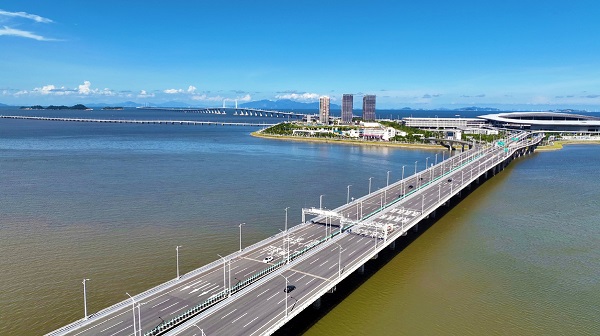Steps likely to brighten GBA business climate

This photo taken by a drone shows vehicles running on the Hong Kong-Zhuhai-Macao Bridge on July 11, 2023. [Photo/Xinhua]
More measures are in the pipeline to optimize the business environment in the Guangdong-Hong Kong-Macao Greater Bay Area to make it globally competitive, officials said on Thursday.
The three regions' strengths will be exploited fully, they said.
Key measures might include removal or relaxation of market entry restrictions for Hong Kong and Macao investors, facilitating the implementation of special market access measures in areas like Guangdong-Macao In-Depth Cooperation Zone in Hengqin in Guangdong province, Nansha district in Guangdong, and Shenzhen in the same province, said Guo Lanfeng, a senior official of the National Development and Reform Commission, the country's top economic regulator.
The goal is to optimize the local business environment, ensure fair market competition and help lower operational costs of companies. Proposed measures will likely seek to improve government administrative services, advance problem-solving mechanisms through enhanced regulation and strengthened copy right protection, promote the integration of the Greater Bay Area into the global supply chain, and increase support for talent, Guo said.
The remarks came after a three-year action plan released on Monday by the NDRC signaled a potential relaxation or removal of eligibility criteria, shareholding ratios and industry access restrictions for Hong Kong and Macao investors, emphasizing increased openness in the financial sector.
"The Greater Bay Area has already made a lot of progress in 'hard' connectivity, which can be seen from the improved cross-boundary transportation network. Now, the government is making great efforts to enhance 'soft' connectivity, including the convergence of systems, rules, policies and laws," said Guo Wanda, executive vice-president of the China Development Institute, a Shenzhen-based think tank.
Mentioning Shenzhen as an example, Guo Lanfeng of the NDRC said: "Eligible enterprises in Qianhai in Shenzhen will enjoy a reduced corporate income tax rate, with timely adjustments to the tax incentive catalog. For Hong Kong residents working in Qianhai, any part of their individual income tax exceeding the amount taxed in Hong Kong is exempted."
Qianhai, short for the Qianhai Shenzhen-Hong Kong Modern Service Industry Cooperation Zone, serves as a crucial link between Hong Kong and Shenzhen. In recent years, efforts to promote its development have yielded positive results.
According to Qin Weizhong, mayor of Shenzhen, Qianhai attracted $33.66 billion in investment from Hong Kong. It is now home to around 600 Hong Kong startups.
Wong Yat-lung, deputy director of Pan Sutong Shanghai-Hong Kong Economic Policy Research Institute, said he believes that with comprehensive infrastructure and unique geographical advantages, Qianhai can serve as a great platform to attract enterprises from the mainland as well as Hong Kong and boost cooperation. Qianhai will also benefit from this process, he said.
Chan Kwok-ki, chief secretary for the administration of the Hong Kong Special Administrative Region, said Hong Kong is committed to actively promoting the construction of the Greater Bay Area insurance service center, supporting Qianhai enterprises in financing, expanding overseas businesses, issuing green bonds, and facilitating financial and technological cooperation.
Guo Wanda of the CDI noted that while Hong Kong faces challenges in maintaining its traditional advantages and developing new ones, Macao is striving to diversify its economy to reduce the risk of relying solely on the gaming industry. These challenges can be addressed and platforms like Qianhai, Hengqin and Nansha will play a significant role in the process.
Hengqin, short for Guangdong-Macao In-Depth Cooperation Zone in Hengqin, also serves as a strategic spot that links Guangdong with Macao. Guo Lanfeng of the NDRC said additional measures will be taken to promote diversified industrial development within the area.
These include the establishment of a "white list" for research and development items, and enabling the entry of research equipment, samples, reagents and consumables from the zone into the mainland market free of mandatory product certification.
Support is also being extended for the establishment of an international green energy certification center by key industry enterprises, which is set to be registered in Macao, for operations within Hengqin.
All rights reserved. Presented by China Daily









